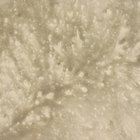
Roquefort cheese is a decadent blue cheese from France. This cheese has a strong aroma and creamy, potent flavor that goes well with nuts, fruits and wines such as port and muscat. Roquefort cheese can be a wonderful treat for anyone who enjoys fine cheeses. However, there are a few health concerns to keep in mind when eating Roquefort cheese.
Obesity
Roquefort cheese is delicious and decadent. Like many decadent foods, this cheese is high in calories and fat. In one ounce of Roquefort cheese, there are about 105 calories and 9 grams of fat. High calorie and fat intake can easily lead to obesity. Obesity, in turn, can lead to a number of health problems, such as diabetes, heart disease and high blood pressure. When enjoying Roquefort cheese, indulge infrequently and in small amounts in order to reduce both the fat and calorie intake.
High Cholesterol
Roquefort cheese, aside from being caloric, also has a high fat and cholesterol content. There are about 26 mg of cholesterol in a single ounce of Roquefort cheese. Only about 200 to 400 mg of cholesterol should be eaten per day. Cholesterol accumulates in the arteries of the body, leading to restricted blood flow. People with high cholesterol face heart disease, as well as problems with arteries in other parts of the body, such as those leading to the brain. People with high cholesterol should avoid high-fat, high-cholesterol foods, such as Roquefort cheese, or eat this cheese in small quantities only.
Mold
Roquefort cheese is aged for several months, until it develops a harmless, flavorful mold. This mold gives the cheese its blue coloring, and is why many different cheeses are called blue cheese. Although this mold is harmless, other types of mold can quickly grow on a Roquefort cheese that has been left too long, or has not been properly stored. These other molds can easily make a person sick. Because the cheese is already moldy, determining if there is new mold can sometimes be challenging. Store this cheese wrapped tightly in plastic wrap. Keep it in the refrigerator for only between three and four weeks.
Listeriosis
Listeriosis is a serious bacterial infection. It’s caused by the bacteria Listeria monocytogenes. This bacteria, which is often found on animals or animal food products, such as soft cheeses, can lead to serious illness when consumed. Vomiting, skin irritations, lethargy and jaundice are only a few symptoms. Serious health problems such as meningitis and septicemia can also result from this bacteria. In pregnant women, miscarriages and stillborn births are common when Listeriosis has been contracted. Although this bacteria is relatively rare in high enough concentrations to cause health problems, and does not usually occur on pasteurized products, it’s important to remain cautious. Only eat fresh, pasteurized cheeses from reliable retailers. Avoid soft cheeses, such as Roquefort, if you’re pregnant.
Related Articles

About Cheese Sticks

A List of Dutch Cheeses

What Type of Microorganism Is Used to ...

Fresh Mozzarella vs. Regular Mozzarella ...

How to Freeze Cheeses

What Types of Cheeses Are Unpasteurized?
Can I Eat My Cheddar Cheese Past the ...

The Difference Between Fresh Cheese & ...

How to Tell if Mozzarella Is Bad

Aged Cheeses That Do Not Melt

How to Store Cheese

A List of Foods Containing Microbes

Uses for Curdled Milk

What Good Bacteria Is in Cheese?

Does Blue Cheese Spoil?

How to Keep Muffins From Going Moldy

Pecorino Cheese Nutrition

Provolone Cheese Nutrition Information

Bad Effects of Chocolate

Swiss vs. Cheddar Cheese Nutrition ...
References
- Cheese-France: Roquefort
- Health Network: Obesity and Health Concerns
- Still Tasty: Roquefort Cheese, Sold in Wrapped Wedge
- "The Complete Food Counter"; Annette B. Natow, Ph.D., R.D., et al.; 2003
Writer Bio
Ann LaPan travels exuberantly in body and mind via planes, trains, automobiles and superb literature. A webmaster, website designer, graphic artist, accountant and musician (Jill of all trades, master of a few), she writes Today’s Horoscope for Shooting Star Astrology.com.
Photo Credits
Eising/Photodisc/Getty Images